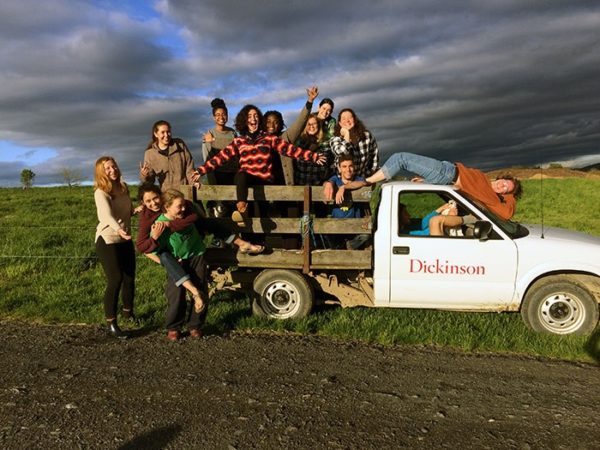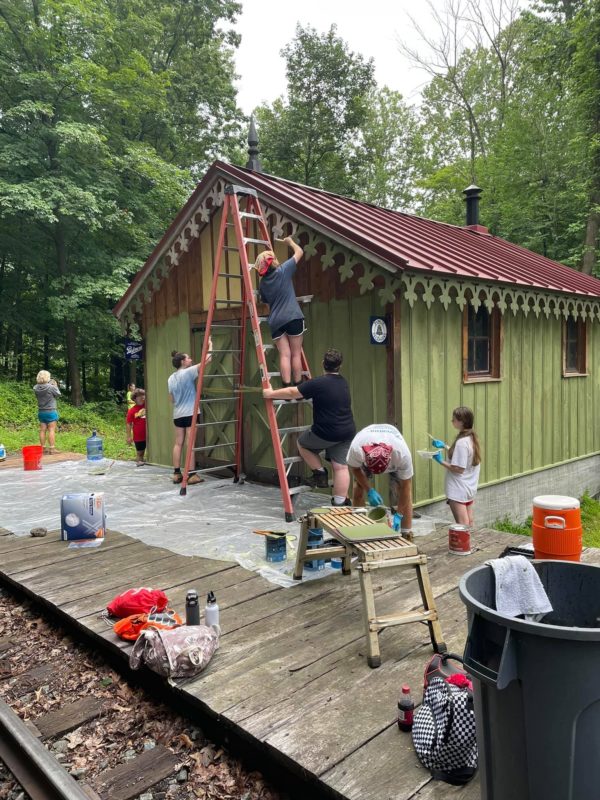READING, PA (July 28, 2021) – The Met-Ed Sustainable Energy Fund of Berks County Community Foundation has awarded $110,000* in grants to three renewable and sustainable energy projects.
Grant recipients, grant amounts, and projects:
- Colebrookdale Railroad Preservation Trust, $50,000: To create an off-the-grid education center – the Colebrookdale Children’s Educational Grove – showcasing sustainable energy practices.
- Dickinson College, $50,000: To construct, study and demonstrate a commercial anaerobic digestion system for the generation of renewable electricity from agricultural and food processing wastes at a scale appropriate for an average Pennsylvania dairy farm. (*This announcement now reflects a grant of $50,000 for this project. The original grant of $25,000 was augmented by an additional $25,000 that the Met-Ed Sustainable Energy Fund was able to award to the project after receiving a special allocation for projects of this type from the Pennsylvania Public Utility Commission. This post was updated 8/11/2021.)
- Berks History Center, $10,000: To implement energy-saving measures in the organization’s building based on the results of a professional energy audit.
“The impact of these grants will go far beyond the physical costs of the projects. The off-the-grid education center is an innovative way to teach children and adults about energy generation, while the anaerobic digester project will give smaller dairy farms and food processors valuable data about alternative ways to handle waste,” said Heidi Williamson, Community Foundation senior vice president for programs and initiatives. “And by using the results of an energy audit to guide its investments in new systems, Berks History Center will support the environment while ensuring its artifacts are protected.”
Colebrookdale Children’s Educational Grove
Colebrookdale Children’s Educational Grove will be at a wilderness site accessible only by the Colebrookdale Railroad’s restored trains or the railroad’s people-powered “railbikes.”
The site’s history means visitors’ discovery and exploration will occur within the context of the full arc of the nation’s industrial story, from iron pioneers, to industrial blight, to ecological reconciliation, said Nathaniel Guest, executive director of the Colebrookdale Railroad Preservation Trust.
“An off-the-grid education center nestled in the woods at the site of the New World’s first iron industry, the Grove will demonstrate wind, water, and solar energy,” Guest said. “These power sources gave life to the folks who first settled here hundreds of years ago and are our best hopes for a clean-energy future.”
Educational programs will be offered – in partnership with Berks Nature and the YWCA Tri-County Area – free of charge to Pennsylvania students, Guest said.
Guest characterized the Met-Ed Sustainable Energy Fund grant as an innovative investment in the future. It will support the development of the overall energy generation plan for the site and the installation of a small solar array with battery backup.

Waste to Energy: Practical Anaerobic Digestion System for Small to Mid-Size Dairy Farms
The Dickinson College Farm provides hands-on educational resources for students, faculty, and the community on topics of sustainable food production, renewable energy generation, and responsible land stewardship.
“The Dickinson College Farm is grateful for the support of the Met-Ed Sustainable Energy Fund of Berks County Community Foundation to help complete our waste to energy project, which is at the forefront of the College’s climate change mitigation efforts,” said Ben Sweger, Dickinson Associate Director of Sponsored Projects. “In 2020, Dickinson College became one of the first institutions in the country to achieve carbon neutrality in operations. The grant-funded project will convert agricultural and food processing residues into 200,000-plus kWh per year of clean renewable electricity via an anaerobic digestion system, allowing the farm to become net positive in energy production.
“The digestion system will also reduce water, soil, and air pollution while strengthening the local farm economy. Working with several community partners, we will use our expertise in public education to promote this state-of-the-art waste to energy technology to farmers, ag, and recycling professionals throughout the mid-Atlantic region, with the objective of increasing proliferation of anaerobic digestion systems on small- to mid-size dairy farms in the coming decade. The generous grant from the Met-Ed Sustainable Energy Fund of Berks County Community Foundation will be used toward utility-interactive power supply components for the new energy system.”
The Met-Ed Sustainable Energy Fund is one of many sources of funding for this large project.

Berks History Center Energy Efficiency Project
Berks History Center’s museum building at 940 Centre Avenue in Reading recently underwent an energy audit that was funded by the Met-Ed / Penelec Sustainable Energy Fund through Berks County Community Foundation. The audit included 10 energy conservation opportunities with the potential to save $10,000 per year in energy costs. Completing the recommended projects would create a more sustainable climate for the irreplaceable artifacts entrusted to Berks History Center and produce savings that can be reinvested into preservation and education initiatives each year.
One of the resulting recommendations was to seek additional financial support from the Met-Ed Sustainable Energy Fund to implement a plan to replace the existing steam boiler.
The museum building is comprised of a structure constructed in 1928 and an addition built in 1988. The new addition has a hot water system that was added to the old steam system via a steam-to-hot-water convertor, new circulating pumps, hot water supply, and return piping.
This project will change the building heating system to entirely hot water.
“The Berks History Center is so grateful to the Met-Ed Sustainable Energy Fund of the Berks County Community Foundation for providing the first significant contribution toward critical upgrades to our museum’s heating system,” said Benjamin K. Neely, Executive Director of the center. “Our museum’s heating system will provide a more stable climate for the artifacts preserved here when completed.”
Met-Ed / Penelec Sustainable Energy Fund
The Metropolitan Edison Company Sustainable Energy Fund of Berks County Community Foundation and the Pennsylvania Electric Company Sustainable Energy Fund of the Community Foundation for the Alleghenies distribute money in the form of grants and investments for a variety of projects within the territories originally served by the two electric companies. The two funds share an advisory committee and are known in the singular as the Met-Ed / Penelec Sustainable Energy Fund.
More information, as well as maps and zip codes of areas serviced by Met-Ed and Penelec, is available at www.bccf.org/sustainable-energy-fund/.
The mission of the fund is to support:
- the development and use of renewable energy and clean energy technologies.
- energy conservation and efficiency.
- sustainable energy businesses.
- projects that improve the environment in the companies’ service territories, as defined by their relationship to the companies’ transmission and distribution facilities.


###
NEWS RELEASE






